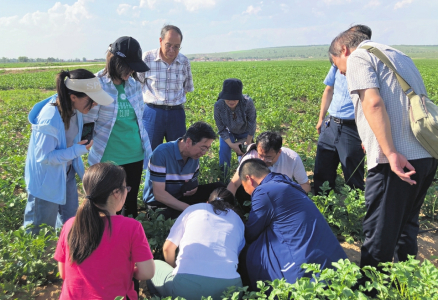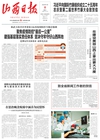Potato farming in Wuzhai explodes in profitability
By renting land from local farmers, company sets an example by modernizing the industry
Potatoes have been the staple crop in Wuzhai, a county in the west of Shanxi province, for many years. But it was recently developed into a major source of revenue for its residents because of an agricultural campaign that is dubbed as the "potato revolution" by people in the area.
Officials, agronomists and industry insiders said the campaign is an initiative to modernize the potato industry, which involves breeding research to improve crop yields and quality; modernizing farming by enlarging operational scale; lifting efficiency to produce an increase in added value; and expanding marketing channels by integrating dealership networks with e-commerce tools.
They said the potato revolution campaign is a transformation to nurture a modern industrial chain. This requires the engagement of a full group of stakeholders including farmers, farming companies, research and development entities and agricultural product processing enterprises, as well as dealers both online and offline.
Xu Cunxiao, a farmer in the village of Xiaohetou in Wuzhai, said he doesn't quite understand the "abstract concept of the potato revolution", but he can explicitly tell the difference made by the transformation.
"I used to grow corn on my family farm of about 1.3 hectares," Xu said, adding the annual net income from the farm was about 10,000 yuan ($1,380).
Now that Xu has leased the farmland to an agricultural company for potato farming, processing and sales, his family is paid a rent of about 16,000 yuan a year.
"I also work for the company's potato processing plant, which pays me about 4,500 yuan a month," Xu said. He said his job in the company has ensured him a stable revenue, which is far better than his situation in the past.
"When I operated my own farm, I was concerned about a lot of things," Xu said. "Many of the things were beyond the limits of my ability, like the unpredictable weather, the fluctuating market and sales."
He said he is happy that the family's income is much higher and more stable thanks to the company that rented his land and hired him.
The company he refers to is Landun Xumei Food, one of Shanxi's leading enterprises in the farming, deep processing and sales of potatoes.
Landun Xumei used to mainly focus on the deep processing of potatoes and sales of finished products. It had suffered from the short supply of potatoes when it began to expand its operations in 2019, company executives said.
The company's management then realized operating its own farms in Shanxi could effectively address the problem of supply. In December 2020, Landun Xumei signed an agreement with the county government of Wuzhai to develop a demonstrative base for potato farming and processing.
The company established its own farms in Wuzhai in 2021 by renting land totaling 2,000 hectares from local farmers.
Since then, the company has set an example by modernizing the potato industry in Wuzhai and its excellent practices have been immediately copied by farmers and other enterprises in the county.
The company's executives said its operational practices involve the training of farmers for better skills, collaborating with agronomists in breeding research to improve the crop's output and quality, launching projects to improve the soil and irrigation of farms and using farming machines on a larger scale.
One of its initiatives that is widely praised by farmers is its skill training program.
Li Meixiao, 64, another resident from Xiaohetou village, also works with the company.
"I never expected I could learn so many skills and techniques for modern farming at such an age," Li said. "I realized the simple things like fertilizing, irrigation and crop thinning can make a big difference for crop yields if I do them right."
The farmer added that he can also apply these skills and techniques to his own small farm and he is sure that the yield and quality will improve substantially.
Executives of Landun Xumei explained that such training courses aim to nurture qualified workers to suit the company's demand for modern farming.
Yan Huiping, a crop breeding expert in Shanxi province, is now heading a team of researchers to work with Landun Xumei in research and to promote their joint results to the entire county of Wuzhai.
"We are studying to foster advantageous breeds of potatoes featuring higher quality and output and suitability for mechanized farming and deep processing," Yan said.
The expert said an extended industrial chain from research, farming and processing to sales can greatly increase the added value of potatoes.
"In the context of modern operations, we expect that the yield from 1 hectare of potatoes can eventually create a value of more than 105,000 yuan ($14,490) for the whole industrial chain," Yan said. "That's almost five times the revenue generated from conventional farming."
Liu Zhicheng, Party secretary of the county, said he is very optimistic about the potato revolution campaign in Wuzhai.
"Our trials over the past years have yielded satisfactory results," Liu said. "Our initial success is the substantial increase in output."
He noted that per-hectare yield in the county's potato farming modernization pilot zone reached 75 metric tons last year, more than three times that of conventional farms. He added the highest output of a farm there was 97 tons per hectare, a new per-unit record in Shanxi.
The official said if these advantageous breeds and new operational models are promoted to all of the county's potato farms totaling 20,000 hectares, "the outcome could be phenomenal".
Based on their success in 2021, Wuzhai's modernized potato farms continued to expand in scale this year. Local statistics show the total area of such farms reached 4,000 hectares this year, doubling the figure posted in 2020.
The successful experience of Wuzhai has also been copied by other regions in Shanxi. The Shanxi Department of Agriculture and Rural Affairs said the potato revolution campaign has been expanded to 11 counties in eight cities, with the total area of modernized potato farms at 7,100 hectares.
The department's officials said the province aims for its modernized potato farms to increase to 20,000 hectares by 2025.
By YUAN SHENGGAO
Wang Xiujuan contributed to this story.












